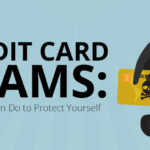Managing your credit wisely can make it much easier to qualify for a credit card or loan with a low-interest rate — or to qualify for a loan or credit card at all. The same is true for leasing an apartment, obtaining a home or auto insurance policy, or getting a job.
Doing a good job of managing your credit matters even more when you consider that millions of Americans — close to half of credit card holders, according to one survey — carry a credit card balance from one month to the next. Overall, the average American consumer deals with between $90,000 and $100,000 in debt.
When you take all of that into account, carefully managing your credit should be an everyday habit, not a once-in-a-while event. Follow along to learn 10 ways you can effectively deal with your credit every day of the year.
1. Pay at least the minimum balance every month
One of the most important habits you can establish with credit card bills is to pay at least the minimum balance each month. This way, you can avoid late fees and keep late payments from showing up on your credit reports.
Better yet, try to pay more than the minimum balance each month. This helps you pay off debt more quickly so that you don’t rack up as much in interest charges.
Ideally, you should pay the full balance of every credit card account every month. Doing this lets you steer clear of interest charges altogether. However, don’t sacrifice covering other expenses, such as rent and utilities, to pay the full balance on a credit card. This could wind up putting you in a deep financial hole.
What happens if you make only the minimum payment?
Here is an example of why it makes sense to pay more than the minimum amount on a monthly credit card bill.
Let’s say you have a credit card with 25.99% APR (annual percentage rate) and a $30,000 balance. If you don’t rack up additional charges but make only the minimum monthly payment of $1,050 (3.5%), you would erase the balance in just over 30 years and end up paying a whopping total of $78,251.76 (charges plus interest).
If you don’t rack up additional charges on that same card and pay $51 a month (just $9 more than the minimum payment), you would clear the balance in about three years and wind up paying $1,830. That’s $313 less than the total you would pay just making the minimum payment.
Many credit card statements contain a section that goes over the only-the-minimum-payment and above-the-minimum-payment scenarios.
2. Make timely payments
Payment history is the #1 factor in calculating your credit scores. For the widely used FICO credit score, it makes up 35% of the scoring formula. For the less popular VantageScore, payment history amounts to 40% of the scoring formula. Therefore, paying bills on time is critical to keeping your credit scores healthy.
In addition to maintaining good credit scores, timely debt payments can:
- Save you money in the form of interest charges.
- Help you obtain low-interest credit cards and loans.
- Decrease stress over your finances.
Which common payments should you prioritize when it comes to your credit scores? Here are the five big ones, not in any order of importance:
- Credit card payments
- Student loan payments
- Auto loan payments
- Rent
- Utility bills
3. Sign up for automatic payments
Signing up for payments to be made automatically can prevent you from missing a payment, which might trigger late fees or damage your credit scores.
When you set up automatic payments (known as autopay), you are authorizing a creditor to electronically pull a set amount of money via your checking account or debit card on a regular basis (generally once a month).
Automatic payments can be made for:
- Credit cards
- Mortgages
- Auto loans
- Student loans
- Utility bills
- Gym memberships
- Streaming services like Netflix and Hulu
4. Shop around
When you’re hunting for a credit card or loan, be sure to do your homework and check out several credit card issuers or lenders. In addition to the interest rates, consider the fees, customer service reviews, and the availability of online account access or through an app.
In the end, shopping around for the best credit card or loan deal could put more money in your pocket.
5. Create a budget
A monthly budget tracks all your income and expenses, including any payments that go to credit card issuers and other creditors. Among other benefits, a budget helps you avoid overspending, save money, and reduce or avoid debt.
Establishing a budget doesn’t need to be complicated. It could be as simple as writing down all your income and expenses in a notebook every month. You could also use a spreadsheet. Or you might turn to a budgeting app like Goodbudget, Mint, Pocketguard or You Need a Budget (YNAB).
However you create a budget, be sure to stick with it. Otherwise, all of that budgeting work will have been for nothing.
People Also Read
6. Limit your borrowing
It is never a good idea to borrow more money than you can realistically pay off. This recommendation applies to credit cards, personal loans and any other type of debt.
As a rule of thumb, you shouldn’t use more than 30% of your available credit (otherwise known as your credit utilization ratio). The more of your available credit that is used, the more your credit scores will likely go down.
So, let’s say you have two credit cards. Each card has a credit limit of $2,000, giving you total available credit of $4,000. If one of the cards has a balance of $250 and the other has a balance of $500, your overall credit utilization ratio would be 18.75%.
The amount of credit that is available versus the amount of credit you use generally makes up 30% of a FICO score and 20% of a VantageScore.
It’s worth noting that credit utilization covers revolving credit accounts, such as credit cards. A revolving credit account allows you to borrow up to a certain credit limit and carry a balance from one month to the next. It does not cover installment accounts, which includes auto loans and personal loans. An installment credit account lets you borrow a lump sum of money and then make equal payments (like $350 per month) to erase the debt.
7. Set up an emergency fund
An emergency fund can be a financial lifesaver. It contains money that you set aside for financial emergencies and unexpected bills. This cash can help you avoid adding to your debt if you are in a financial pinch — such as when you lose your job or when you have undergone emergency surgery.
Many experts suggest putting enough money in your emergency fund to cover three to six months’ worth of expenses. This includes mortgage or rent payments, groceries, health care and debt payments.
8. Check your credit reports and credit scores
To stay on top of your credit, make it a habit to regularly check your credit reports and credit scores. These days, many banks, credit card issuers and personal finance websites offer both for free.
When you read your credit reports, keep an eye out for any errors that might be weighing down your scores. For instance, a bill payment might have incorrectly been reported as late. Errors like this can harm your credit scores. If you do spot a mistake on a credit report, file a dispute with the credit bureau that prepared the report in an effort to get it fixed.
In addition to checking your credit reports, be sure to check your credit scores, particularly if you are getting ready to apply for a credit card or loan. When you know what your scores are, you can take action to improve them if they are not where you would like them to be.
Generally, both FICO and VantageScores range from a low of 300 to a high of 850. On the FICO scale, 670 to 739 is considered a good credit score. On the VantageScore scale, a score of 661 – 780 falls into the good category.
9. Go over your monthly statements
Don’t ignore the monthly credit card and loan statements that you receive in the mail or can access online. Instead, review them to look for errors or unfamiliar transactions.
Any mistakes on your billing statement might be harmful. For instance, you may notice what appear to be several unauthorized transactions on your credit card statement; this could mean you have been the victim of fraud. If you see something wrong on a billing statement, contact your credit card issuer or lender as soon as possible.
10. Get help if you are overwhelmed by debt
Many of us run into debt problems. It is nothing to be ashamed of — or to ignore.
If you feel like your debts are spiraling out of control, reach out for help.
- Contact your credit card issuer or lender. They might be willing to work out a payment plan to help you get back on track. For instance, a credit card issuer might be able to temporarily reduce your monthly payments for a certain amount of time.
- Reach out to a nonprofit consumer credit counseling agency. Among the services they offer are helping you create a budget, offering advice on managing your finances and coming up with what is known as a debt management plan to reduce the amount of money you owe to creditors. The National Foundation for Credit Counseling is a great place to start your search for a credit counselor.
- Consider a debt consolidation loan. This arrangement lets you combine several debts into a single loan, potentially at a lower interest rate than the average amount of your current debts. If nothing else, a debt consolidation loan can simplify your finances by merging several debts into one monthly payment.
- Explore a balance transfer card. A balance transfer card lets you switch balances from other accounts to one credit card account. In many cases, a balance transfer card comes with an introductory 0% APR on your balance for a certain period, often from 12 to 21 months. If you are able to secure a card with a temporary 0% APR, you could save hundreds or even thousands of dollars in interest — as long as you pay off the entire balance before the 0% offer expires. If you can’t, you are on the hook for high-interest debt, which could put you in a worse situation.
- Look into debt relief. Explore your options with a debt relief, or debt settlement, company like National Debt Relief. Simply put, a debt relief company charges a fee to negotiate with creditors on your behalf. As a result, you pay less than what you owe. You can become debt free and get your life back in as little as 24-48 months.









